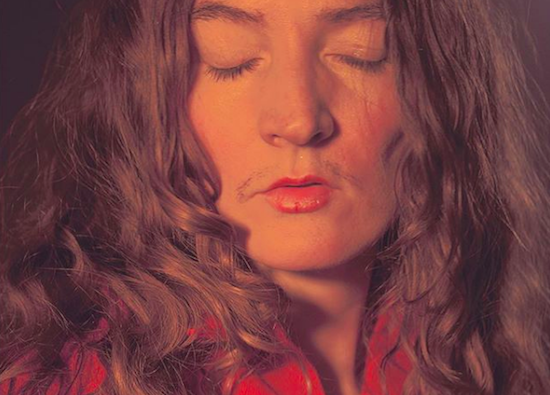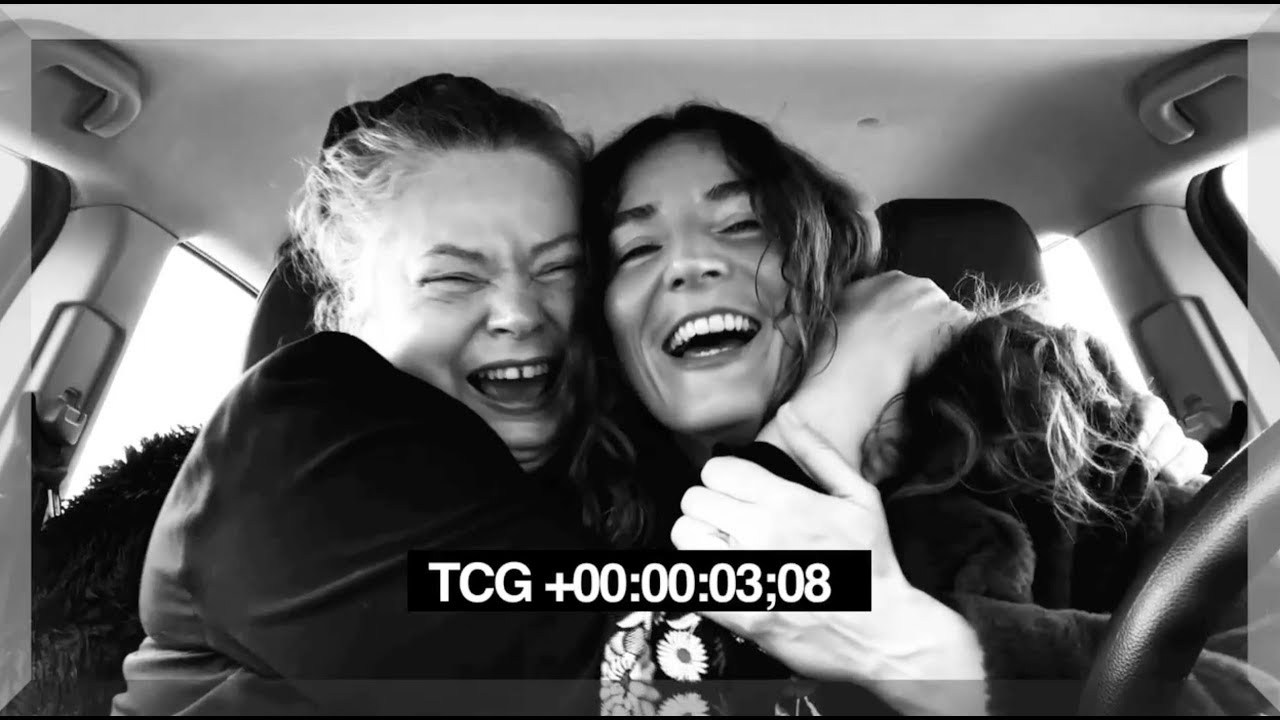Photo by Goodyn Green
Trans… trans… trans… short for transition, if you like, or transform, or transcend, and also for ‘Transome’ which is the lead single from Planningtorock’s new album, Powerhouse. It’s a perfect song for feeling yourself, to use that excellent phrase: it has not one but two ace synth hooks, it mixes sexy-relaxed with playful-upbeat, it uses slinky 90s production and sweetly processed vocals to create a feelgood feelproud genderqueer dance track.
“I think it’s quite irresponsible to make sad music right now,” Planningtorock said when we spoke last week. “I really do! I’m not saying sad songs can’t exist, but we live in very very hard times and I’m conscious of making music that sounds very positive. That’s important for me.”
Powerhouse is Jam Rostron’s fourth album but in some ways it feels like a debut: there is a stepping out and a sense of ‘here I am’ which is related to their transition over the past couple of years, and also to their autobiographical depiction of family on the record. The title track, a softly soaring ballad-lullaby, is about Jam’s mum, Janet; second single, ‘Beulah Loves Dancing’, is an almost ridiculously joyful and bouncing ode to their sister.
Rostron is from Dunscar, just north of Bolton, Lancashire, left school at 14, and got into art college through hard work and hustle. “My mum was fierce. She contacted the local art school and told them, ‘My daughters are really really talented, you should take them.’ And they did. Then later I applied to Sheffield [art school], and I didn’t have any qualifications but I’d made so much work, drawings, paintings… I’d learned my mum’s hustle, and I just made myself undeniable. I worked as a cleaner in an old people’s home in Sheffield, to finance it. The art school had an amazing media department and that’s where I learned about video and making music.”
Then, 18 years ago, they left the UK and moved to Berlin: “Everyone in my family was struggling – my dad had undiagnosed bipolar, my mum was diagnosed with cancer, my sister is autistic. It was intense and it felt like I was the only one who didn’t have something to deal with. In terms of learning boundaries and learning how to take care of myself, I had to pull myself out of it and create a life for myself.”
It worked. Have It All, their 2006 debut, was a whoosh of energy and power; on W transformations (and PTR’s signature voice pitching) were beginning; with All Love’s Legal Rostron began to really mix politics and dance music in a way that holds on to the pleasure, the fun. “And then Powerhouse takes all that experience, everything I’ve learned about songwriting, to find a way to talk about things I needed to get out.”
It’s quite extraordinary to hear an album that describes family with so much love and without even a smidgen of conservatism. Rostron is, as they’ve described it in the past, “into this idea of queering sonics, making non-heteronormative music” and their music – especially on Powerhouse – is part of a house tradition, a tradition of queerness and blackness and the working classes, and of solidarity.
“It’s really about creating sound that best supports queer content. I can’t really describe it more than that: sonic homes for queer content. Queering sonics is a feeling – talking of house music and the roots of house music – it’s about creating a presence and a feeling.”
The album also has a house production sound, a simplicity and a tenderness that, it’s fair to say, harks back to late-80s and early-90s Bolton where Rostron grew up. “I love 90s production. There’s simplicity in those dance tracks, there’s one or two components, and they’re usually perfect to conjure up the right vibes.
“Music is a big bridge between my queer family and my mum and my sister. My mum used music as a ritual – she’d play it so loud, you’d walk into the living room and she couldn’t hear you – and I saw how it enthused her, lifted her up. And I saw that music gives you love because it can change your mind about things, it can bring you to a different place to help you deal with things.”
There’s also a giving of thanks on the album, most explicitly to Janet, on that title track, and Jam’s older sister Beulah. “I wanted to find a way to write about her. There are so many stories, and I didn’t want to just write about her autism – I tried that but I didn’t want that.” There’s a short monologue, an anecdote really and a beautifully familiar moment, at the start of ‘Beulah Loves Dancing’ where Jam talks about the Walkmans the sisters were given as kids, and the hours Beulah spent dancing in her bedroom to mixtapes she’d made from local rave radio stations. “This anecdote just encompassed everything, it communicated a very important part of her and a very important part of my life, because she got me into dance music.”
Rostron’s open about their own experiences, and about some painful aspects of family history. “There’s lots of stuff on this album that could come across as tricky, as difficult, but I’m good – and I’m good because of this record. It was a healing record. This record was good for my health.”
They’ve described this album as having “a radical vulnerability” – which is, I point out, a great phrase. “It’s a great experience as well. I highly recommend it,” they smile a huge relaxed smile. “It’s about becoming visible as a genderqueer person.”
“This album has a lot of vulnerability. I know a lot of artists who do that, and I’m always in awe of them. Angel Haze, when she first started putting music out on Soundcloud years ago, wrote a track about the abuse she suffered at the hands of her uncle and it blew me away. She owned that experience, and it really shocked me and it stayed with me for a long time. I was in awe of her. It had an effect on me and of course it gave me courage to find a way to write about my experiences… I knew it was something I needed to do.”
Near the start of the Powerhouse, ‘Dear Brother’ is a delicate and quietly brutal song about abuse that lifts from sorrow and despair to a letting go. “The lyrics are precise, selective,” says Jam. “Not too busy, not too much information. It just says what needs to be said, and it’s healing.”
That anecdote at the start of Beulah Loves Dancing is important, too, because so much of Planningtorock’s music use vocal processing, but here track their Bolton accent is untouched.
“I needed to tell that story in the way that me and my mum and my sister chat together. We know these stories, and we still tell them constantly, years later, and laugh our arses off. It’s about my dad, as well. My dad died when I was 20, it was very sudden, of a brain hemorrhage. It was really shocking, and we still talk about him a lot. So, with the dialect, it didn’t make sense to process it or even to sing it. I just had to tell the story.”
That vocal pitching plays an integral part on the rest of the album – much as the process is maligned by those who feel rigidly and illogically protective of ‘authenticity’, the shifting pitch of Rostron’s voice gives the vocals an inviting softness and an uncanny power. “When I first pitched my vocal, it was incredible,” Jam says. “It was like I heard myself for the first time.”
“I recorded a track, I think it might have been ‘Doorway’, and I made it higher – there’s a function in Ableton Live that allows you to warp a track, so I pitched it up and I sang it at a higher pitch. Then I took everything back down. And because I was singing out of my range, it brought out a different emotion in my vocals. It was like: There I am. It was a moment. I really felt visible. And then I got into using a pedal, TC Helicon, which is brilliant because it actually has a gender button on it. There’s two buttons, one’s for gender and the other one’s for hard or soft. I generally have it quite hard. And I love it.
“The pitching is linked to my transition, too. It’s the sonic embodiment of me taking testo – I’m on a really small dose of T but my voice will drop. My voice dropped anyway, before that, I don’t know if it happens with a lot of singers but if you hear my early stuff I sound like a mouse – so squeaky! So this idea of ‘realness’, it’s phoney. A lot of British people, when they sing, they assume an American accent. Is that real? As an artist, you find your realness. It’s a personal experience.”
Rostron has been developing a live show in tandem with the album, with financial backing from Germany’s public arts body. “I’ve got this friend who helps people get creative funding, and she sent me this list of the people who were getting funding and it was just this – sorry to say it – this list of straight white dudes getting a lot of money for making boring electronic music. So she said, ‘You’ve got to apply.’”
And now there’s a whole team of dancers, choreographers, set designers, lighting directors building the live show, including Austrian choreographer Ian Kaler, Finnish dancer and writer Maija Karhunen, and Italian singer and dancer Ambrita Sunshine. “It feels like a real queer family, it’s wonderful.”
“There’s dance, there’s duets, there’s songs that aren’t on the album, there’s a lot of biographical film. It’s not ‘Powerhouse The Musical’, but it has that musical feel to it. I’ve made so many shows and now I have the resources to fulfil some of the ideas I’ve had for a long time. And I want Janet and Beulah to be on stage with me: I would love to sing ‘Powerhouse’ to my mum on stage. Because what is music if it’s not for creating moments where you can genuinely say ‘thank you’?”
Powerhouse Live is at Berghain in Berlin on 16 & 17 January and at La Gaîté Lyrique in Paris on 20 January, then in Munich, Dresden, Paris and London – details tba. The album is out now




